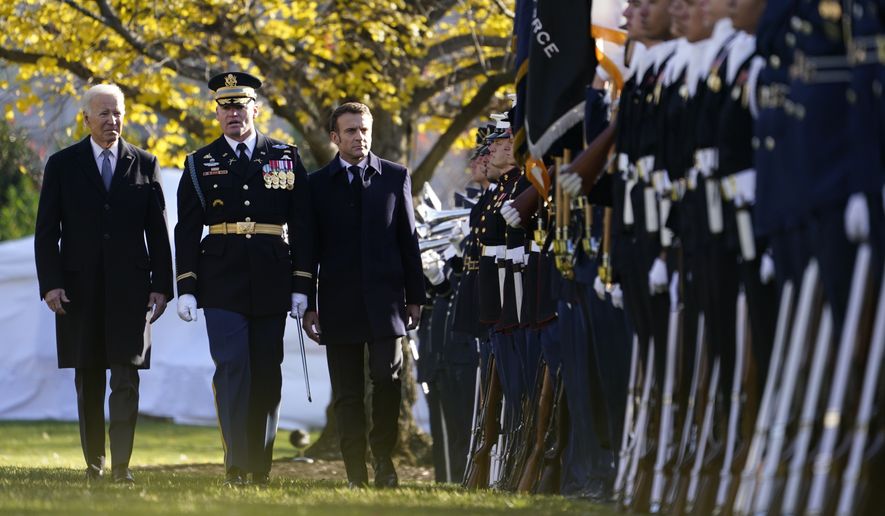The close alliance on green policies between President Biden and President Emmanuel Macron of France shatters when it involves greenbacks.
That’s why Mr. Biden will be forced to defend his $740 billion tax, climate and health care law on Thursday when he hosts Mr. Macron for the first visit and state dinner of his presidency.
The White House billed the glitzy affair as a symbol of the strong ties between the U.S. and its oldest ally and a chance for the two countries to rearm their close alignment on global issues, including climate change, the war in Ukraine and competition with China.
Key points of contention are expected to surface behind closed doors, however, as the two leaders get down to brass tacks on Mr. Biden’s seminal legislative accomplishment, what his Democratic allies in Congress dubbed the Inflation Reduction Act.
Mr. Macron is among a chorus of European officials up in arms over the law’s generous tax credits for U.S.-manufactured electric vehicles, which they say pose a direct threat to their economic interests.
Europeans say the tax credits threaten to cripple their manufacturing as automakers move operations across the Atlantic to capitalize on the incentives, sucking away jobs and investment money as the bloc braces for economic headwinds.
SEE ALSO: Inflation in Europe eases but still in painful double digits
“The risk is that this could become a downward spiral that could poison the trans-Atlantic partnership,” said William Drozdiak, a fellow at the Washington-based Woodrow Wilson International Center for Scholars and author of “The Last President of Europe: Emmanuel Macron’s Race to Revive France and Save the World.”
“This is a serious issue, and they’re going to have to start finding a way out of this,” Mr. Drozdiak said. “This is going to be an important visit, and certainly it’s going to be the most contentious issue that Macron and Biden will discuss.”
French Finance Minister Bruno Le Maire, who is joining Mr. Macron for his visit this week, said the French president fully intends to address the issue head-on in Washington. He previewed a request for “exemptions on some duties and limits imposed” by the Biden administration.
“The real question we must ask ourselves is what sort of globalization is ahead of us?” Mr. Le Maire told France 3 television. “It is time Europe favors European production. All European states must understand that today in the face of these American decisions, we must learn to better protect and defend our economic interests.”
Senior officials in the Biden administration said they fully expected the Inflation Reduction Act to be a topic of discussion during the visit but attempted to downplay the friction between the leaders.
“Obviously, combating the climate crisis is a shared goal of the United States and France, and the IRA is a substantial accomplishment in terms of the United States doing its part to help deliver on those climate goals,” a White House official told reporters. “But beyond that, the IRA presents significant opportunities for European firms as well.”
Tensions over the tax and climate law add to the choppy relationship between the U.S. and France under Mr. Biden’s tenure.
Relations between the U.S. and France hit a low point last year after the Biden administration went forward with a technology-sharing pact with Britain and Australia, known as AUKUS, that was meant to counter China.
The agreement undercut a multibillion-dollar conventional submarine deal between France and Australia signed in 2016. In the fallout, France recalled its ambassadors to the U.S. and Australia in September 2021.
Jean-Yves Le Drian, the French foreign minister, accused the U.S. and Australia of lying about the pact. He said the move was “a major breach of trust and contempt.”
France reinstated its ambassadors after Mr. Biden spoke with Mr. Macron by phone.
“The French were really angry on a number of levels,” Mr. Drozdiak said. “It has left a residue of resentment that they’re now trying hard to overcome. That’s why they were given the first state visit under the Biden administration, and they’re trying to talk about cooperation in other areas such as space research.
“But this trip could be undermined unless the French and the Europeans get some promises of action on the green subsidies and the Inflation Reduction Act,” he said.
The White House dismissed any suggestion that the state visit was meant as a sort of olive branch for the AUKUS deal.
Senior officials noted that President Obama hosted French President Francois Holland as the first state visit of his second term. President Trump also hosted Mr. Macron for the first state visit of his administration.
“This visit largely serves as a celebration of the strong footing of this relationship, one that is well-rooted in our history, from the very beginnings of our country,” National Security Council spokesperson John Kirby told reporters, referring to the French support of the Continental Army in the Revolutionary War. “You can expect to see on display both our long-shared history as allies as well as our deep partnership in taking on the most urgent global challenges of today and tomorrow.”
• Joseph Clark can be reached at jclark@washingtontimes.com.




Please read our comment policy before commenting.